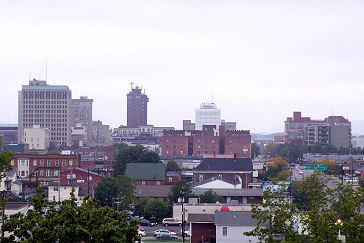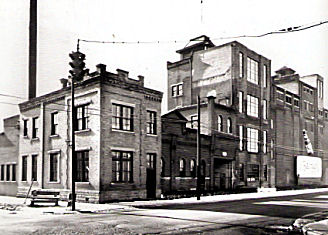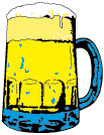IN THE BEGINNING
The history of brewing beer in Huntington, West Virginia as we know it always begins in the same year, with the same brewing company, in the same spot: "In 1891, The Huntington Brewing company built a large facility in what was then Central City."
Was it really the first brewery  in the area? After all, the first settlers had begun arriving in present-day Huntington just after the American Revolution. At some point before 1891, wouldn't they have been thirsty for beer that was fresher than what could be shipped in? For now that question remains unanswered. But consider that by 1873, when the city of Huntington was barely two years old, there were 4,131 breweries in the United States.
in the area? After all, the first settlers had begun arriving in present-day Huntington just after the American Revolution. At some point before 1891, wouldn't they have been thirsty for beer that was fresher than what could be shipped in? For now that question remains unanswered. But consider that by 1873, when the city of Huntington was barely two years old, there were 4,131 breweries in the United States.
A partial view of downtown Huntington looking due-west from a vantage point at Marshall University. Photo courtesy of Delano Patterson.
In those days, the neighborhood brewery was as common as the neighborhood baker, and beer was considered a food staple. Every town of any consequence had breweries. The majority were family-run affairs, very small and personal, some producing as little as a few hundred barrels a year or less. Bottling was still a new and inconsistent technology, so beer was generally consumed either on the brewery premises in adjoining "brew pubs," or in saloons within a short distance from the brew house. Patrons wishing to take beer home used containers or buckets called "growlers." Portsmouth (Ohio) Brewing Company apparently shipped quantities of beer up the Ohio River to the Huntington area beginning in the late 1800s. Also during this time the Reymann Brewing Company of Wheeling had Huntington on a strategic list of cities throughout the region where it operated beer-depots (warehouses). At least two brewers are said to have produced beer in Charleston between 1874 and 1878. However, it is unlikely they were large enough to supply their products to accounts as far away as the "Jewel City."
The tremendous amounts of beer being "imported" from surrounding areas along with the imminent annexation of Central City by Huntington may have influenced investors to get into the game. But to build a large full-scale commercial brewery without a few prior attempts by others to establish operations in the community was a true test of faith, as the beer landscape was rapidly changing. Many small firms couldn't compete, especially anyone making an inferior product.
By the time The Huntington Brewing Company opened in 1891, the age of the "beer barons" was in full swing. The number of U.S. breweries had dropped to about 2,000, as larger plants were constructed by bigger companies to make more and more beer, a cycle that would repeat itself on a different level following Prohibition. The brewery in Central City struggled and was eventually sold to The American Brewing Company, who likewise found the market difficult to tap...pun intended.
The Fesenmeier family stepped in and acquired the brewery in 1899 and found it to be in an excellent geographic location with a well-designed layout. It was re-christened as The West Virginia Brewing Company, and although the family renamed it Fesenmeier Brewing in 1934, the brewery would not change hands again until 1968 when it became Little Switzerland Brewing. The rest of the story is well-documented on this website, so there's little point in repeating it here.
When prohibition finally ended in 1933, the large national brewing companies, affectionately known as "macros," much as they had done in the "beer baron" heyday in the late 1800s were ready to swallow up anyone in their way including themselves, which they succeeded in doing eventually. The 2008 sale of the last big American-owned national - Anheuser-Busch to Inbev, completed the job. Every brewing company was a target for ambush no matter how small or insignificant.

(right) The Fesenmeier Brewing Company circa 1956 at 14th Street W.
looking west up Madison Avenue.
By late 1949, the big national and larger regional brewing companies had a new weapon, television. The introduction of TV and the record amounts of beer advertising that eventually came with it played a major role in their growth. And with their huge volumes of production capacity, they were able to cut their profit margins and force smaller brewers to compete on price. One by one the macros gobbled them up or ran them out of business altogether.
The Kroger n' Heck's Saga
KROGER INDECISIVE
Over the years Central City Plaza, the shopping center that replaced the former Fesenmeier brewery after it was senselessly demolished in 1972, has become a seedy relic of a bygone era. Kroger supermarket was the initial tenant on the site of the brewery between Monroe and Madison avenues. A couple years later a Heck's discount store opened on the south side of Monroe Avenue across from the brewery property. The Kroger Company could never make its mind up where it wanted to be in Huntington's west end, and had thus far occupied different locations at different times.
It was no big surprise then, when Kroger decided to abandon the Fesenmeier site just a few years after tearing down the brewery, returning to Adams Avenue where they built a huge new store. They apparently didn't fancy this location whole hell of a lot either, and finally left Central City altogether, building another new store at 1st Street & 7th Avenue where they've remained since the 1980s. It too has become a seedy relic, but that's another story!
HECK'S A REFLECTION OF AMERICAN BREWING INDUSTRY
In an ironic twist of events, the entire Heck's chain fizzled out in the late 1980's, suffering a fate similar to the local and regional brewing companies (like Little Switzerland) that were either swallowed up or put out of business. Heck's was a strong discount department-store chain based in West Virginia. It was founded in 1963 in Charleston, peaking out with 165 locations in several mid-Atlantic states by 1986, and served as the retail arm of automotive supplier Steel City Products, Inc. Their fortunes were short-lived though, as competition from Wal-Mart and K-Mart made it increasingly difficult for the regional chains to compete. Stores like Heck's, Hill's, Hart's, H.L. Green, Woolworth, McCrory's, and hundreds of others have all but disappeared from the landscape.
In 1990, 55 of the last 57 last Heck's stores were sold to Retail Acquisition Corporation who effectively "closed-out" the chain by converting it into a "closeouter" called L.A. Joe's (the other two were sold to the Fisher's Big Wheel retail chain, which itself was completely out of business by 1994). L.A. Joe's lost money right off the bat and 22 stores were liquidated in 1991. A couple of the old Heck's stores near Huntington were turned into L.A. Joe's. One was just across the river in Proctorville, Ohio. These lasted almost 15 minutes. By 1992 it was all over, and the remaining stores were liquidated.
RELATED LINK:
For a list of defunct department stores in the United States, click HERE. But be forewarned, you may become sick to your stomach while reading it.
 Brewing in Huntington after 1971
Brewing in Huntington after 1971
The art of brewing beer returned to Huntington in elegant fashion in 1996 with BrewBākers Restaurant and Brewery. It had a top-of-the-line brewing system, complimenting a top of the line operation: the brewmaster (imported straight from Bavaria), the beer, the chef, the menu, the bakery, the decor....everything. The city fell in love with its new brewery. But the fun was over almost as soon as it began. Brew Baker's was in financial trouble that is widely believed to have been caused by a host of problems encountered during construction. The name was changed to River & Rail Brewery in 1997 and then closed for good in 1998. The large crowds that regularly packed the joint failed to generate enough cash flow to keep it open. While it lasted though, this facility produced some of the finest beers anywhere.
When BrewBākers opened I worried it would end up being a "too good to be true" phenomenon. My worst fears were realized. It's easy to sit here and speculate on what went wrong without knowing all the facts. But one look at the size and scope of the restaurant and the renovations that took place and the picture begins to unfold. At the risk of sounding too much like an arm-chair quarterback, I always felt from the get-go that the best plan would have been to mimic what had been done successfully in Portsmouth, OH and Parkersburg, WV by simply adding a brewery to an already existing restaurant such as Chili-Willi's, or else pick a smaller, less expensive design and just get on with making good beer.
Brewing Returns to Huntington Again!
Following the demise of Brew Baker's, Huntington became the only major city along the Ohio River without a brewery of its own. Pittsburgh, Wheeling, Parkersburg, Marietta, Portsmouth, Cincinnati, Covington, Newport, Louisville, Evansville and more all had at least one brewery. Now of course many of these cities have multiple breweries . But for almost 20 years Huntington did not. Thankfully the city's fortunes changed in 2016 with the opening of a beautiful 10 barrel brewery, The Peddler, located at 833 3rd Avenue right next door to the former Brew Bakers!
. But for almost 20 years Huntington did not. Thankfully the city's fortunes changed in 2016 with the opening of a beautiful 10 barrel brewery, The Peddler, located at 833 3rd Avenue right next door to the former Brew Bakers!
The Peddler began selling beer in 2017, thus ending the drought. The brew master happens to be the older brother of a close friend of ours. I had very few chances to return to Huntington after it opened due to my being on the road in a band. Then the pandemic hit and I was off the road immediately. Finally in the spring of 2023, I got my first chance to sample their beers. Everything I tried was fantastic! Now when I go back home it's nice to know that The Peddler is there. Be sure to support them if you live in the Huntington area or travel there. (peddlerwv.com)
Photo by Sarah Short
Trade Names and Timeline for the Brewery at
14th St. W & Madison Ave. 25708
 Huntington Brewing Company 1891-1895
American Brewing Company 1895-1896
American Brewing & Ice Company 1896-1899
West Virginia Brewing Company 1899-1914
CLOSED BY STATE PROHIBITION in 1914
Huntington Brewing Company 1891-1895
American Brewing Company 1895-1896
American Brewing & Ice Company 1896-1899
West Virginia Brewing Company 1899-1914
CLOSED BY STATE PROHIBITION in 1914
- Issued U-Permit # WVA-470 which permitted brewing operations to resume in 1933


Fesenmeier Brewing Company 1934-1968
Little Switzerland Brewing Company 1968-1971
August Wagner Brewing Company 1971
- Brewery sold at public auction in 1970 to August Wagner of Columbus, Ohio who closed the plant for good in 1971.
- Brewery demolished by Kroger, who built a new store on the site in 1972
- Brewery site abandoned by Kroger after a short stay. (exact date unknown)



























 in the area? After all, the first settlers had begun arriving in present-day Huntington just after the American Revolution. At some point before 1891, wouldn't they have been thirsty for beer that was fresher than what could be shipped in? For now that question remains unanswered. But consider that by 1873, when the city of Huntington was barely two years old, there were 4,131 breweries in the United States.
in the area? After all, the first settlers had begun arriving in present-day Huntington just after the American Revolution. At some point before 1891, wouldn't they have been thirsty for beer that was fresher than what could be shipped in? For now that question remains unanswered. But consider that by 1873, when the city of Huntington was barely two years old, there were 4,131 breweries in the United States. 
 Brewing in Huntington after 1971
Brewing in Huntington after 1971 . But for almost 20 years Huntington did not. Thankfully the city's fortunes changed in 2016 with the opening of a beautiful 10 barrel brewery,
. But for almost 20 years Huntington did not. Thankfully the city's fortunes changed in 2016 with the opening of a beautiful 10 barrel brewery, 